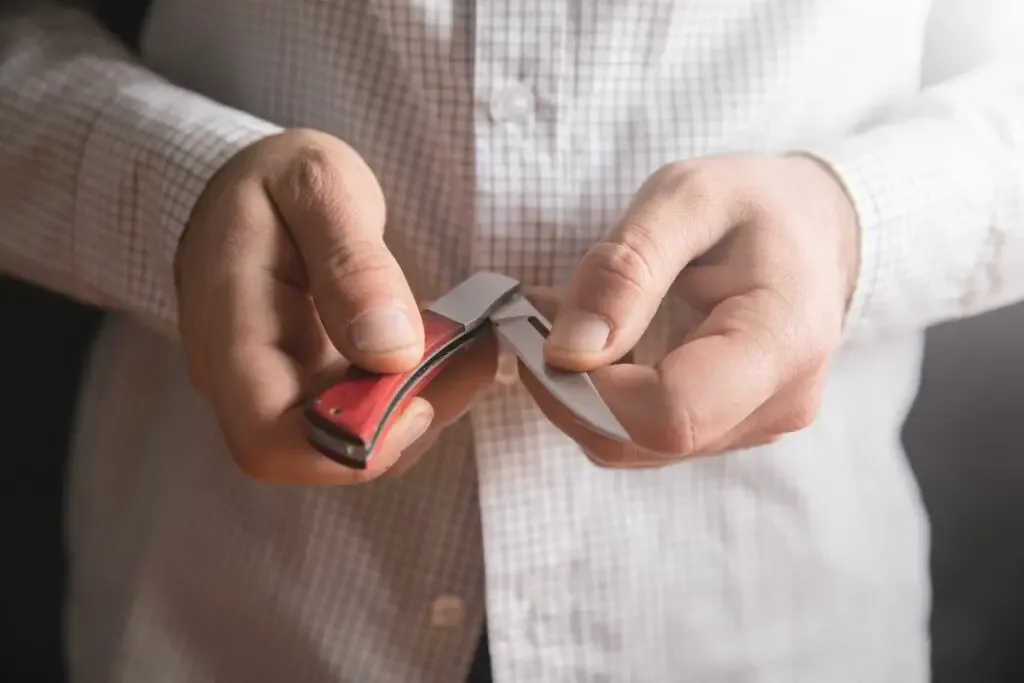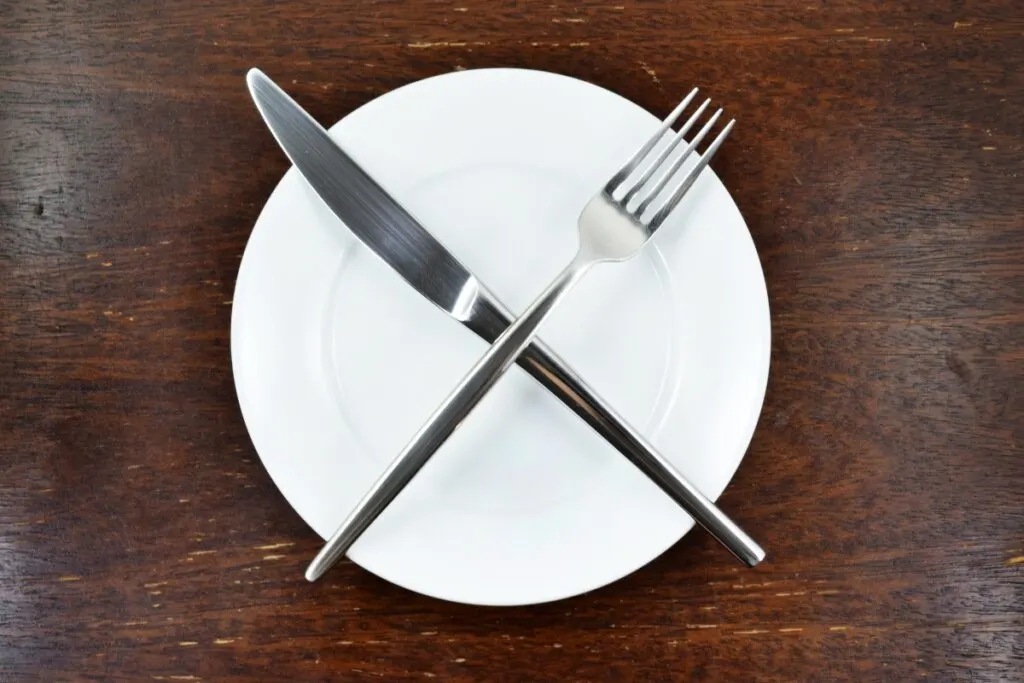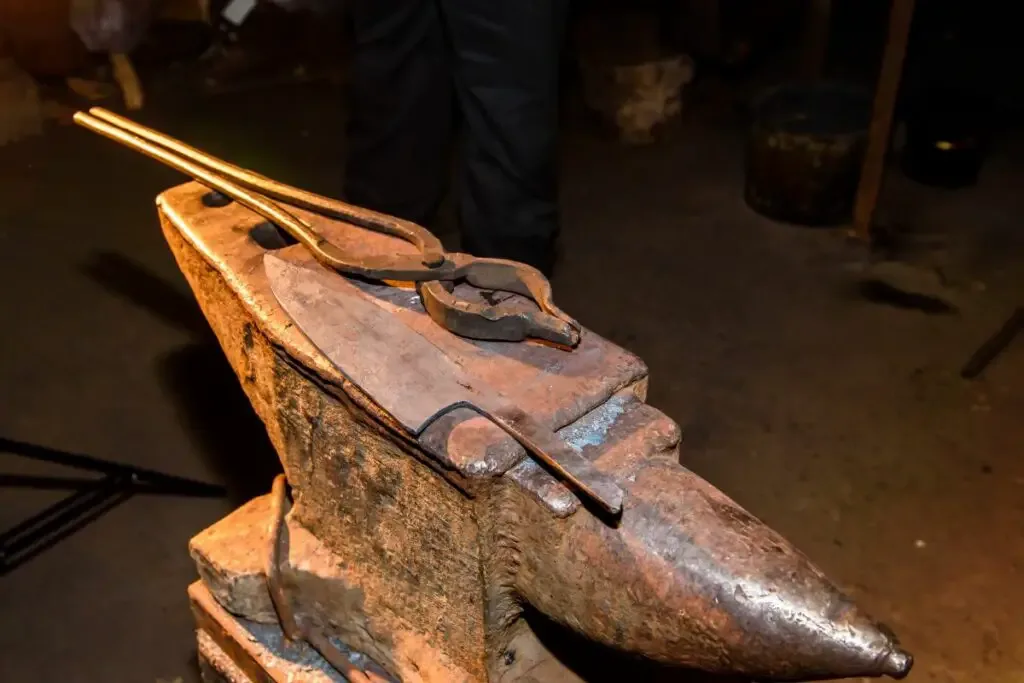As an Amazon Associate, we earn from qualifying purchases with no additional costs for you.
Knives have been a part of human culture, survival, and religion for millennia, so unsurprisingly, many superstitions and beliefs have arisen over the years. Knife superstitions have been credited with breaking friendships or even the simple solution for getting a good night’s sleep.
The importance of knives in our history and culture has resulted in superstitious beliefs about using knives and how they are handled. These beliefs are not unique to a single culture or people group, indicating knives’ profound influence on a global scale.
Our modern, enlightened age has largely dismissed past superstitions, but it is interesting to read these concepts and understand the role knives have played in our history and culture. From religion to good and bad omens, safety, and protection, there is no doubt that knives have left an indelible mark on human culture and society!
If you are interested in checking out the best kitchen knives, we recommend buying knives made by the Wüsthof company. You can find them by clicking here (Amazon link).

Common And Unusual Knife Superstitions
We all take knives for granted in modern times. We use knives to prepare food, eat, hunt, defend ourselves, or even as an everyday tool that we carry with us.
Knives are no less significant in our modern lives than our ancestors, but we no longer attribute the same connotations to knives, such as luck, destiny, and spiritual intervention.
A superstition is defined as a notion or belief not based on science, knowledge, reason, or logic. The belief is usually ominous in nature or that the event can shape subsequent events or the future.
Superstitions are mostly disappearing from our society, but certain people still hold onto these traditions, sometimes without even realizing it themselves.
The specific ways we do things, such as setting the table for guests or placing our eating utensils on the plate after a meal, have their roots in old-time superstitions.
Knife superstitions are not restricted to specific geographical locations but come from all parts of the world.
Many of the superstitions involving knives relate to a time when spirits, demons, and luck were considered to play a significant role in the fate of humans.
Why Did Superstitions About Knives Develop?
In the early part of human history, knives were integral to survival, but quality knives were expensive and hard to come by.
Knives were also part of a man’s weaponry used in battle or in defense of himself or his family. The importance of knives in day-to-day life meant that they became objects of superstition when things did not go according to plan and knives were involved.
Knives also became a status symbol, with only the rich able to afford high-quality knives, many of which were adorned with precious metals or gemstones.
Religious ceremonies and rituals frequently involved the use of knives, which led to spiritual-based superstitions around knives and their use.
Many social superstitions regarding knives came about because of the general superstitious nature of humans in the early part of our history. We are always looking for something to blame for our misfortunes rather than taking a good look at ourselves!
As we look at some of these superstitious beliefs about knives, be aware that we in no way condone the use of knives in this way. We are simply looking at knife superstitions from the perspective of interest.
TIP: Custom knives are a worthwhile buy for a knife enthusiast or anyone needing a superior-quality knife. Find out if you should buy a custom knife in the article below:
Custom Knives: Should I Buy One? (Costs, Investment & More)
1. You Don’t Own A Knife Till It Has Tasted Your Blood
This superstition implies that you do not truly own a knife until you have cut yourself with it. The idea is that once you cut yourself accidentally with a knife, you have a special bond with the knife.
I certainly hope this superstition is not valid, given the number of knives I own! I would not have the space on my hands for all the scars!
2. Never Gift A Knife To A Friend
The superstition about giving a knife to a friend is that the relationship is doomed because the knife will sever the friendship.
This superstition probably arose after a lifelong friend gifted the other person with a knife, and shortly after, they had a quarrel, which dissolved the friendship.
According to tradition, the only way to stop the superstition in its tracks when a friend gifts you a knife is to give them something in return, usually a penny or other small denomination coin. This effectively purchases the knife from the friend, bypassing the effect of superstition.
Giving other items in exchange for the knife gift, such as an item of clothing or jewelry, is also an acceptable exchange to avoid negative consequences.
Fortunately, I do not subscribe to this superstition and welcome all knife gifts!
3. Never Gift A Knife To A Spouse Or Lover
This superstition is similar to gifting a knife to a friend, but in this case, the superstition is that the knife will sever the love between the couple.
Many people take this superstition further and will not give a knife as a wedding gift to avoid it becoming a problem for the couple’s relationship.
4. Never Hand An Open Pocket Knife To Someone

Handing an open pocket knife to another person is considered a no-no because you will receive lousy luck in return.
This belief probably arose from someone handing over an open pocket knife and accidentally cutting the other person in the process. The superstition makes good sense from a safety point of view but became a general omen of bad luck.
Another similar superstition is that you should always give a pocket knife back the way you received it. If someone handed the knife to you closed, you should hand it back closed to avoid bad luck.
Yet another pocket knife superstition is that you should never close a pocket knife that someone else has opened, or you will have bad luck.
This implies that if you find a pocket knife lying about that someone else has opened it, you should not close it. The person who opened it must close it to avoid bad luck.
In this case, the superstition goes against knife safety, as an open knife lying around can be hazardous.
TIP: A Swiss Army Knife is an iconic pocket knife and one of the predecessors to the modern pocket multitool. Check out the complete guide on buying a Swiss Army Knife in the article below:
Buyer’s Guide: Why & Which Swiss Army Knife You Should Buy
5. If You Drop A Knife, Expect A Gentleman Caller
An old Irish belief is that if you drop a knife in your home, you can expect a gentleman caller, but if you drop a fork, a lady visitor will be on your doorstep shortly. The belief extends to dropping a spoon, implying a child will visit your home.
These beliefs were generally held by the women in the household, who were responsible for preparing meals or setting tables.
In some cases, an eligible young woman would hope that accidentally dropping the knife would result in a gentleman caller who would be a potential suitor.
6. Sleeping With A Black Handled Knife Under Your Pillow Wards Off Nightmares
An old Greek belief states that placing a black-handled knife under your pillow will prevent nightmares.
This superstition likely came from an era where personal safety was of great concern and required a weapon close at hand at all times to defend yourself.
Sleeping with a knife under your pillow gives you peace of mind that you are protected with a weapon nearby, which results in a peaceful night’s sleep.
7. Sleeping With A Knife Under Your Bed Scares Away Evil Spirits
This old Chinese belief is similar to the Greek superstition about sleeping with a knife under your pillow.
In dangerous times, a weapon close at hand can give a sense of security, allowing the mind to relax and enjoy a peaceful sleep.
The similarity of these beliefs from two distant parts of the world shows how different cultures placed the same value and significance on knives.
8. Never Use A Knife To Stir
Stirring a drink in a cup, soup in a bowl, or food cooking in a pot with a knife was considered a bad omen that was sure to bring bad luck upon the person brazen enough to perform this heinous act!
The superstition was so common that it was described with the warning, “Stirring with a knife is stirring up strife!”
It is unclear where this superstition originated, but I suspect that a person used someone’s favorite knife to stir their drink, resulting in the knife’s owner taking exception to this and challenging the offender!
Knives are very personal items to many people, so I can relate to this situation, and I can add my own belief to this one; “Don’t touch my knife if you value your life!”
9. Bury A Man With His Knife, So He Is Not Defenceless In The Afterlife
Anglo-Saxon warriors held their weapons in high regard; without them, they were vulnerable and weak.
The unknown of the afterlife meant that warriors did not want to enter the unknown without a weapon to defend themselves.
Many other cultures followed similar traditions and buried warriors with swords, knives, lances, and shields.
TIP: Disposing of kitchen knives is never something that should be done casually. Old or broken kitchen knives can potentially cause injury if not disposed of correctly. Find out more in the article below:
5 Proven & Safe TIPS: How To Dispose Of Kitchen Knives
10. Do Not Cross Your Knife And Fork On Your Dinner Plate

Placing your knife and fork down on your plate during a meal or after the meal where the knife and fork create a cross is considered bad luck.
The main reason for this superstition from Italy is that performing this act insulted the cross of Christ and would result in nothing going your way.
The Italian culture was heavily influenced by the Roman Catholic church, which reveres religious symbols as holy relics, and any insult to these symbols was an insult to the faith.
Another common superstition in the Dark Ages was that if you crossed your knife with any other piece of cutlery at the table, it was a sign that you were involved with witchcraft. This action could have severe implications in those times when witches were drowned or burned.
11. Sharpening A Knife After Sunset Results In Bad Luck
This superstition comes from a time before electricity and artificial lighting. When the sun goes down, and daylight fades, it is difficult to see the fine edge of a knife clearly in the dim light of a lantern or candle.
Sharpening a knife in low light can result in a poorly sharpened edge, which will not cut well or possibly damage the blade.
Fortunately, modern lighting means that you can safely sharpen a knife at night without the risk of ruining your luck!
TIP: Knife sharpening stones, or whetstones, come in such a wide variety that it can be challenging to choose the best stone to sharpen your knives. Find out more in the article below:
All Knife Sharpening Stones Types Explained & Compared
12. A Knife Under The Mattress Can Ease Labor Pains
An old belief was that a knife placed under the mattress of a woman in labor would ease the labor pains she experienced.
Perhaps the idea that she had something with which she could stab the man responsible for her condition gave the mother-to-be a distraction from the painful childbirth! Ladies, don’t get any ideas with this one!
The origins of this belief are unclear, but perhaps the knife under the mattress provided firmer support than the mattress alone, which helped ease the pain.
Remember that mattresses in those days were often made of material stuffed with straw rather than our scientifically designed space-age comfortable mattresses.
A similar belief was that a knife placed under the mattress of a woman in labor would increase the chances of her giving birth to a boy.
So, it was a win-win solution: put a knife under the mattress to ease the pain and give birth to a son! Sons were more desirable in ancient times to carry on the family line.
13. A Dropped Knife Can Determine Your Fishing Success
This superstition says that you will not catch any fish if you drop a knife while out fishing, and the knife lands with the blade pointing to the land.
If, however, the falls with the blade pointing out to sea, you will have a good catch that day! I guess fishermen needed some excuse for coming home with no fish in the boat!
14. Sticking A Knife in Your Front Door Provides Protection
It was believed that a knife stuck in the front door of your house would protect you from your enemies and thieves.
It is likely that a knife stuck in the front door indicated that the homeowner is armed and dangerous, so enter at your own risk. This probably dissuaded would-be thieves and people with malicious intent from breaking into the house.
This sign could be seen as the old-time equivalent of the modern sign stating, “Trespassers will be shot!” It acted as a deterrent to inform would-be criminals that the homeowner has no problem defending his household with violence.
Historical Context of Knife Superstitions
Knives have been an integral part of human civilization since the dawn of time, serving not just as tools for survival but also as significant cultural symbols. The superstitions surrounding knives, as discussed in this article, are not mere folklore; they are windows into the past, offering insights into the societies and cultures from which they emerged.
This section aims to explore the historical context of these superstitions, shedding light on how they reflect the values, fears, and beliefs of different eras and cultures.
Early Human Societies and the Emergence of Knives
In the earliest human societies, the knife was one of the first tools created, primarily for hunting and preparing food. As these societies evolved, so did the role of the knife, transcending its utilitarian purpose to become a symbol of power, authority, and survival.
The superstition that one does not truly own a knife until it has tasted their blood can be traced back to these primal times, symbolizing a rite of passage and a deep connection between the wielder and the tool.
Knives in Ancient Rituals and Ceremonies
In ancient civilizations, knives held a sacred place in religious rituals and ceremonies. For instance, in many pagan traditions, knives were used to draw protective circles or to direct energy, leading to the belief that knives could influence spiritual realms.
This sacred status bestowed upon knives inevitably led to various superstitions, such as the belief in their power to ward off evil spirits when placed under a pillow or bed.
Medieval Times and the Spread of Superstitions

During the medieval period, superstitions flourished against a backdrop of widespread fear and uncertainty. Knives, being common household items, naturally became enmeshed in the fabric of these superstitions.
The belief that crossing a knife with a fork would bring bad luck reflects the societal anxieties of the time, particularly around the supernatural and the unknown. Similarly, the superstition about not gifting knives to avoid severing relationships speaks to the value placed on social bonds and the fear of their disruption.
Knives in the Context of Social Hierarchy and Status
In many cultures, the quality and make of a knife were indicative of a person’s social status. In feudal societies, ornate knives adorned with jewels were the preserve of the nobility, while common folk used simpler versions.
This distinction led to beliefs about the power and prestige associated with certain knives, influencing superstitions around their acquisition and usage.
Global Knife Superstitions
As trade and exploration expanded global connections, knife superstitions traveled and evolved, absorbing influences from different cultures.
This global tapestry of beliefs showcases the universality of knives in human culture, while also highlighting the unique interpretations and superstitions that arose in different regions.
A Reflection of Human History
The superstitions surrounding knives are more than just quaint beliefs; they are reflections of human history, mirroring the fears, values, and customs of various cultures through time.
Understanding these superstitions in their historical context allows us to appreciate the knife not just as a tool, but as a vital component of human heritage and cultural evolution.
Conclusion
Superstitions about knives come from an age where a lack of understanding required an explanation for unexplainable events. The logic of the time suggested that certain physical acts had the power to influence our lives, future, and good fortune.
There is no doubt that knives have played a pivotal role in our history and will continue to play a prominent role in our future. Hopefully, our advancement in knowledge and understanding has put some of these ancient knife superstitions to rest!
TIP: Cutting boards are an essential accessory for kitchen knives, but many people have a love-hate relationship with cutting boards. Check out the explanation of why to always use a cutting board in the article below:
7 Crucial Reasons Why You Should Always Use A Cutting Board

